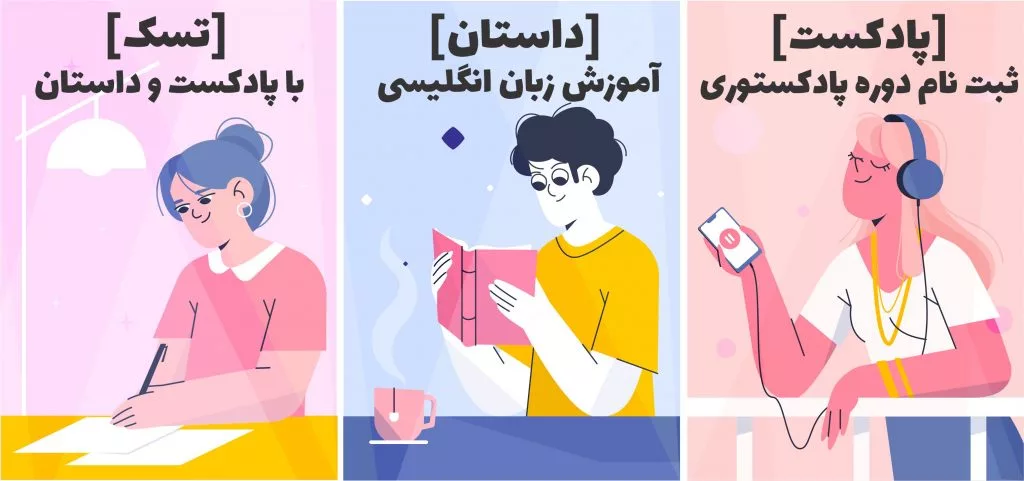پادکست انگلیسی BBC – پیری و بی پولی
آیا نسبت به شرایط زندگی تون بعد از بازنشسته شدن نگرانید؟ برای اینکه بتونید اون طوری که دوست دارید زندگی کنید چقدر پول لازم دارید؟ چقدر پول از نظرتون کافیه؟ (نظر خودتون رو به انگلیسی در بخش دیدگاه با ما در میون بذارید!) در پادکست انگلیسی BBC – پیری و بی پولی میشنویم که نیل Neil و راب Rob درباره ی برنامه ریزی مالی حرف می زنن و در طول مسیر کلمات مربوط به پول رو هم آموزش میدن.
سوال پادکست انگلیسی BBC – پیری و بی پولی :
When was the word millionaire first used in English?
a) 1600s
b) 1700s
c) 1800s
به پادکست خوب گوش کن تا جواب رو پیدا کنی.
اگر می خوای گوش دادن به پادکست تا حد امکان برات ساده و کارآمد باشه مراحل زیر را دنبال کن:
هر روز به پادکست گوش کن. وقتی براش یه وقت ثابت در روز در نظر بگیری برات تبدیل به عادت میشه و این عادت هرروز پیشرفت میکنه.
پادکستی رو پیدا کن که موضوعش برات جالب باشه. وقتی از خود موضوع لذت ببری یادگیری هم برات لذتبخش میشه.
به پادکستی گوش کن که transcript یا متن داره. این بهت کمک می کنه تا کلمات و عبارات جدید رو به سرعت در متن پیدا کنی و ساختار انواع مختلف جمله رو خوب یاد بگیری.
پس از گوش دادن به پادکست با متن، در مرحله بعدی سعی کن بدون نگاه کردن به متن این کار رو انجام بدی. این کار مهارت شنیداری رو تقویت می کنه و کمک می کنه تا انگلیسی زبانان بومی را راحت تر درک کنی، حتی اگر خیلی سریع صحبت کنن.
اگه به پادکست انگلیسی گوش کردی و نتونستی کامل متوجه اش بشی، ناامید نشو. پادکست هایESL -English as Second Language بیشماری وجود دارن که برای سطوح مختلف، از ابتدایی تا پیشرفته طراحی شدن. مطمئنا هر روز می تونین یه پادکست مناسب با سطح خودت پیدا کنی.
فراموش نکن که هرچی بیشتر تمرین کنی در اون مهارت رشد میکنی! به قول انگلیسی ها: Practice makes perfect
واژگان کلیدی پادکست انگلیسی BBC - پیری و بی پولی
| معنی به فارسی | معنی به انگلیسی | واژه |
| پیش بینی جریان مالی | a calculation of how much money you can expect to have at a particular time | cashflow forecast |
| درآمد | money coming in from, for example, your salary | income |
| هزینه، خرج | money you have to pay out for your regular expenses such as rent, food, entertainment, transport, etc | expenditure |
| داراییها | the cash value of things that you own and your savings | assets |
| بدهیها | the cash value of your debts, for example on credit cards or other loans | liabilities |
| کمک کردن به کسی | to help someone | to give someone a hand |
BBC 6 minute English - Do you care if you're poor when you're old

متن پادکست انگلیسی BBC - پیری و بی پولی
Neil
Hello, and welcome to 6 Minute English. I'm Neil.
Rob
And I'm Rob.
Neil
In this programme we're talking about finance and in particular planning for our future lifestyles.
Rob
I can barely afford my current lifestyle!
Neil
Same here, but perhaps we’ll pick up some good tips today. Before that though, a question. Being a millionaire may be an impossible dream for most of us, but when was the word first used in English? Was it:
a) 1600s
b) 1700s, or
c) 1800s
What do you think, Rob?
Rob
I’m going to guess that it’s the 1600s as there have always been very wealthy people.
Neil
Well, I’ll reveal the answer later. Now, the BBC Money Box programme covers all sorts of financial features. Recently they were talking about lifestyle financial planning, which is planning your finances to meet the kind of lifestyle you want to have. Julie Lord leads a financial planning organisation and she talked about the process of lifestyle financial planning. How many numbers does she say you need to start with?
Julie Lord
Well, we would start by saying that we need to put together a lifetime cashflow forecast or a model. You just need four numbers: your income, your expenditure, assets, liabilities and then we project forward to show you what sort of lifestyle you will have if you do nothing at all and if indeed you do some of the things that - perhaps an ISA or a pension or any other kind of financial product - might help you with.
Neil
So how many numbers do you need?
Rob
She says that you start with just four numbers.
Neil
That’s right. The first of these numbers is your income, this is the money that you have coming in, your salary, for example.
Rob
Then there is the number for your expenditure. This is the money you have going out for rent, food, entertainment, transport and so on.
Neil
The next number was for assets. This is the cash value of things that you own. For example property, cars, jewellery as well as savings and investments, that kind of thing.
Rob
And finally there is liabilities. This is the money that you owe, for example on credit cards or loans.
Neil
So if you know these details, she says they can come up with a lifetime cashflow forecast, which is a calculation of how much money you can expect to have in the future and if that is enough to meet your expectations. Do you have those details? Do you know your numbers, Rob?
Rob
I have a very detailed spreadsheet where I do list my income and expenditure. So I do know from month to month how much money I need and how much I can spend.
Neil
That sounds very organised! What does it tell you about your future?
Rob
Well, it just reminds me of exactly how much money I don’t have. It’s quite depressing! How about you, Neil?
Neil
Oh, I live in blissful ignorance. I have no idea how big my debts are. I try not to worry about it. I kind of think I’m much too young to worry about it now and that as if by magic it will all work out in the end. So it would be difficult for me to come up those four numbers. Anyway, let’s listen to Julie Lord again describing the lifestyle financial planning process.
Julie Lord
Well, we would start by saying that we need to put together a lifetime cashflow forecast or a model. You just need four numbers: your income, your expenditure, assets, liabilities and then we project forward to show you what sort of lifestyle you will have if you do nothing at all and if indeed you do some of the things that - perhaps an ISA or a pension or any other kind of financial product - might help you with.
Neil
Is lifestyle financial planning only for older people with a good pension? Not according to Julie Lord.
Julie Lord
Well, it’s not all about old age, is it? I mean there are people… we have quite a number of younger clients who come to us and say 'we just want to get financially organised, we've heard about all this stuff, these financial products, no idea really what they are or, more importantly, what they’re going to do for us, so can you give us a hand to help us look forward to see what will happen'.
Neil
So she also has younger clients who ask for her company’s help.
Rob
Yes, she uses the phrase, give us a hand, which means to help someone. If you give someone a hand, you help them.
Neil
Exactly, in the way that I give you a hand with 6 Minute English.
Rob
Well, I think I give you a hand rather than the other way around, Neil.
Neil
Really, well let’s not fall out about it. Let’s listen to Julie Lord again.
Julie Lord
Well, it’s not all about old age, is it? I mean, there are people… we have quite a number of younger clients who come to us and say 'we just want to get financially organised, we've heard about all this stuff, these financial products, no idea really what they are or, more importantly, what they’re going to do for us, so can you give us a hand to help us look forward to see what will happen'.
Neil
It’s nearly time now to review our vocabulary, but first, let’s have the answer to our quiz question. When was the word millionaire first used in English? Was it:
a) 1600s
b) 1700s, or
c) 1800s
What did you think, Rob?
Rob
Well, I guessed and said it was the 1600s.
Neil
Well, not a good guess this time, I’m afraid. It’s actually a lot later. It was the 1800s when it was first used in English, though it had appeared in French in the 1700s. Now on with the vocabulary.
Rob
Yes, we had a lot of financial terms in this programme. We had cashflow forecast. This is a calculation of how much money you can expect to have at a particular time in the future.
Neil
And the cashflow forecast is based on knowing your income, which is the money you have coming in and your expenditure, the money you have going out.
Rob
You also need to know your assets, which is the value of things you own as well as savings and investments. This is balanced against your liabilities, which is the term for the money that you owe, for example on credit cards.
Neil
And finally we had the expression to give someone a hand meaning to help someone. Well, that’s all from us in this programme. We look forward to your company next time. Until then, you can find us in all the usual places on social media, online and on our app. Just search for bbclearninglish. Bye, and thanks Rob for giving me a hand.
Rob
No, thank you for giving me a hand. Bye!
امیدوارم از پادکست انگلیسی BBC - پیری و بی پولی لذت برده باشید.
گوش دادن به پادکست روش خوبی برای تقویت مهارت شنیداری و هم چنین یادگرفتن کلمات در بستر یک موضوع خاصه که این به تقویت مهارت مکالمه انگلیسی نیز کمک زیادی می کنه.
اگه تو هم از اون آدمهایی هستی که از گوش دادن به پادکست لذت می بره برات یه خبر خوب دارم! آموزشگاه آموزش زبان انگلیسی ۲۴talk یه دوره طراحی کرده مبتنی بر پادکست و داستان کوتاه به اسم "پادکستوری - Podcastory". این دوره سعی کرده یادگیری زبان انگلیسی رو مناسب با نیاز و سطح زبان آموز به یه فرایند بسیار مفرح، موثر، سریع و کم هزینه تبدیل کنه.
همین الان می تونی با کلیک روی عکس زیر و ثبت نام در دوره ی آموزش زبان انگلیسی با پادکست و داستان ۲۴talk اولین و مهم ترین قدم رو برای یادگیری زبان انگلیسی برداری. وقت رو از دست نده!








